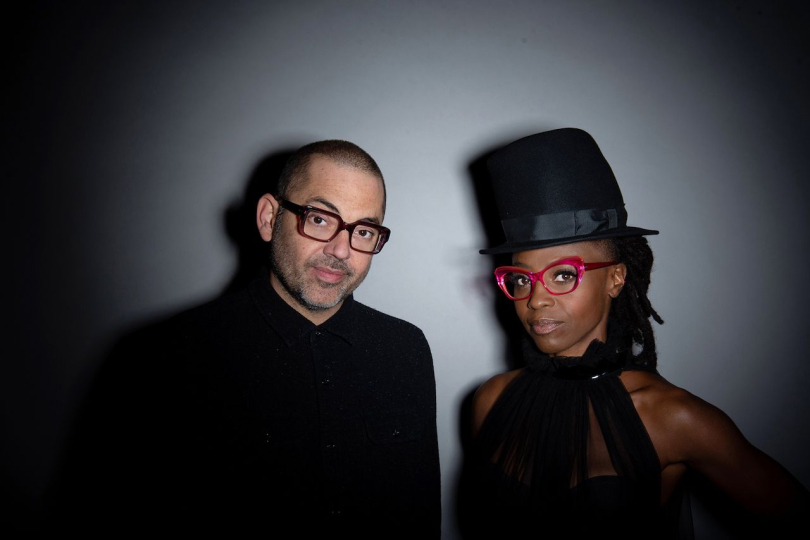
Skye and Ross from Morcheeba: If We Could, We'd Do Everything Differently
Last year, fans were expecting them at Slovakia's Pohoda Festival, but an unexpected windstorm prevented their concert from taking place. However, as the saying goes, every cloud has a silver lining – this year, not only did Morcheeba return to Pohoda's lineup, but they also came equipped with a brand-new album, Escape the Chaos, and performed several songs from it live. Our interview with the band – made up of singer Skye Edwards and guitarist/producer Ross Godfrey – therefore focused primarily on this new record, which once again blends melancholy, groove and trip-hop calm in the true Morcheeba style. At the same time, thanks to greater involvement from accompanying musicians, it retains a sense of organic energy and live chemistry. Given the band's 30th anniversary, we also briefly reflected on the past, discussed each member's favourite live songs, and the changes that occurred after Ross's brother Paul left the band.
The new album promises an escape from the chaos. In your view, what's the best way to find that escape nowadays?
Ross: It’s nice to just turn off all media devices – TV, phones, social media - and simply relax: read a book, meditate, sleep, swim in the sea, or listen to some good music.
I've also read that Skye regularly swims in her own pond. I think the title track sums it all up, this approach to escaping the chaos of the modern world.
Ross: Yeah. There’s a lot of really horrible sh*t going on right now – wars, and it seems like we have more psychopathic world leaders than usual, which really says something. Just in general, I think everybody's life is very chaotic because they never stop working. They never stop answering emails and messages.
Too much information everywhere...
Ross: Yeah, I think I might become a monk (laughs). Not that I believe in God – I just want to spend time in a quiet monastery. I was going to climb up the mountain in a minute and look at the castle (Trenčín Castle).
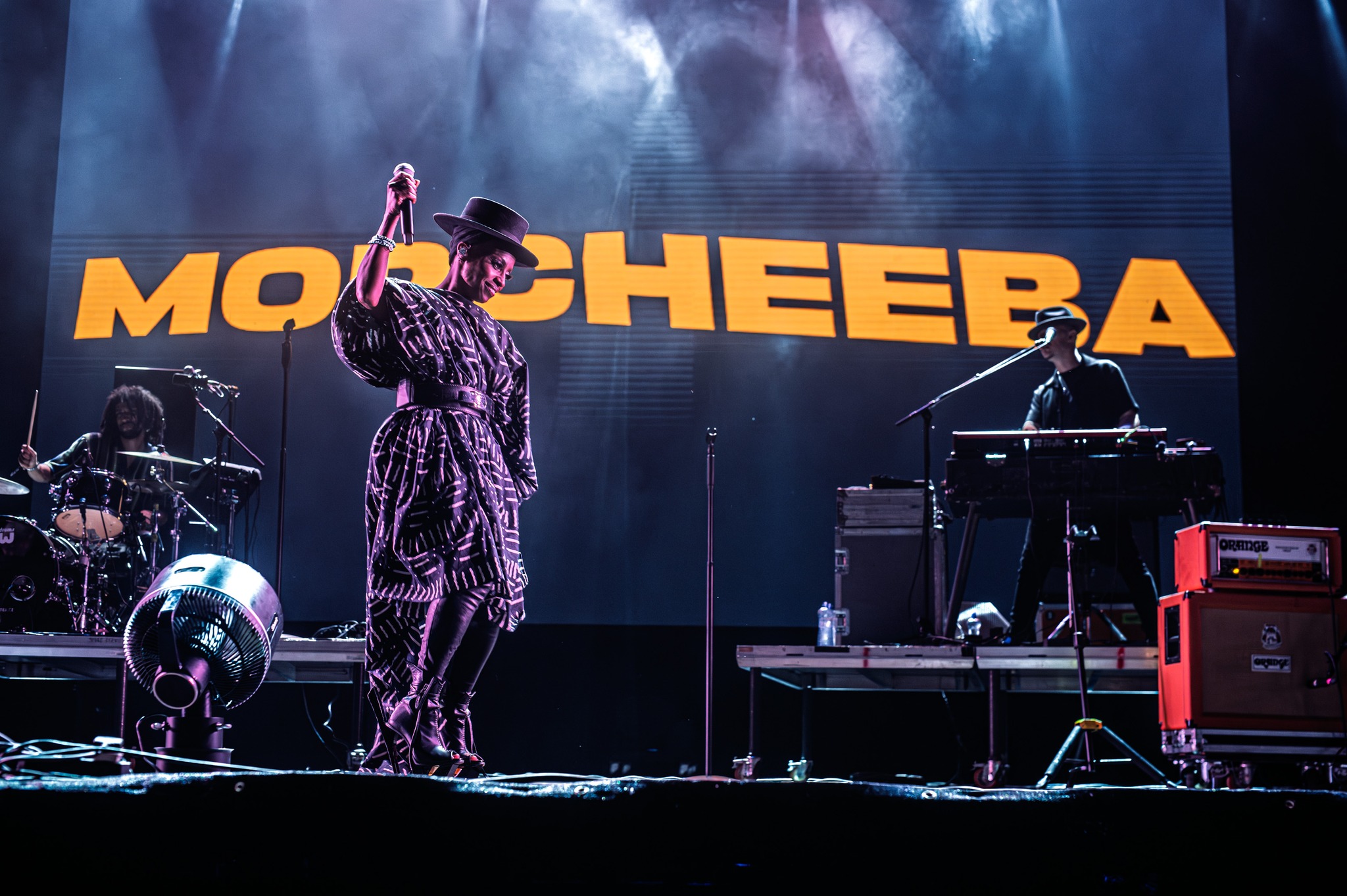
Will you make it before the show?
Ross: Yeah. Hopefully they won't throw a hot tar on me when I get to the entrance.
Skye: Shame! Rotten tomatoes! (laughs)
No, surely not. On the new album, we hear the signature Morcheeba sound ranging from trip-hop to soul, blues, and psychedelia. But on tracks like "Peace of Me", "Dead to Me" and "Bleeding Out", there's a noticeably harder edge both lyrically and sonically, at least within the typical Morcheeba sound. Did these songs respond to personal or global tensions of the past few years, and how do they contrast with gentler tracks like "Call for Love", for example?
Ross: "Bleeding Out" was this track that we recorded in Dublin with a guy called Alex O'Keefe. We were there doing a festival, and he had a little studio booked the next day, so we just went in and jammed it, and it just came out naturally, you know. I came up with some riffs, he had the beat, and Skye came up with the melody. Did you come up with the lyrics then or later?
Skye: A little later, yeah. I mean, it's not like we sort of sit down and say, oh, look at all the crazy shit that's going on in the world, let's write a song to reflect that. It just came out that way.
Ross: And "Peace of Me" is a track we did with a rapper called Oscar Worldpeace, and I had a little bit of music, and I sent it to him, and he'd done the rap, and then Skye came up with the chorus part. So again, that one sort of came together quite organically, and this sort of subject and the lyrics were initially written by Oscar Worldpeace. So, I think I had a conversation with him saying that I liked his name, Worldpeace, and I was like, maybe we can do a track that's about, you know, peace in the world rather than the horrible wars and stuff going on. So that was a little bit premeditated. And as for "Dead to Me", the music was like a kind of homage to Brazilian sort of tropicalia bossa nova from the late 60s. And so, I'd done the music, and then I gave it to Skye, and you wrote the lyrics. And that was sort of a more personal thing, I guess.
Skye: Yeah, yeah. Usually, the melody comes first. As I develop it, I start throwing a few words in. Then I listen to the melody over and over, and it almost feels like the song writes itself.
Do the initial, spontaneous words usually make it into the final version of the song?
Skye: Yeah, in the end they do. I mean, who it's about, I can't really say.
Okay, let's leave it to the listeners in that case.
Skye: Yeah, exactly. I mean, you’re lucky if there isn’t someone in your life you sometimes wish were dead. (laughs)
Ross: Evil laugh, followed by an evil laugh.
Skye: No, I mean, I'm not evil, and I wouldn't wish anybody was dead. But there's some people that hurt us.
Ross: Some people can get on your nerves, can't they?
Skye: Yeah, you just want them to disappear – not necessarily die, just vanish. Maybe they could go to Mars or somewhere far away and never come back. (laughs)
I'm sure we all know people like that. Ross, you mentioned the sessions for the album in Dublin. Were those the early sessions where Skye's son Jaega and her husband Steve joined in on drums and bass, respectively?
Ross: I think it was reasonably early when we did the session in Dublin with Jaega and Steve. And then we continued to write, and then later on we did some sessions in London as well. We did some more live recording because it's nice to play with the band sometimes. Recording can be very insular. It's just me playing the guitar and doing some drums, and Skye singing at home. And sometimes it feels a little bit disconnected when we go out on the road. It's so much fun to play with other people. So, we tried to bring some of the live sound and the vibe and the friendships in the band into the studio to help the record to have more of a broad kind of personality rather than just us being at home all the time.
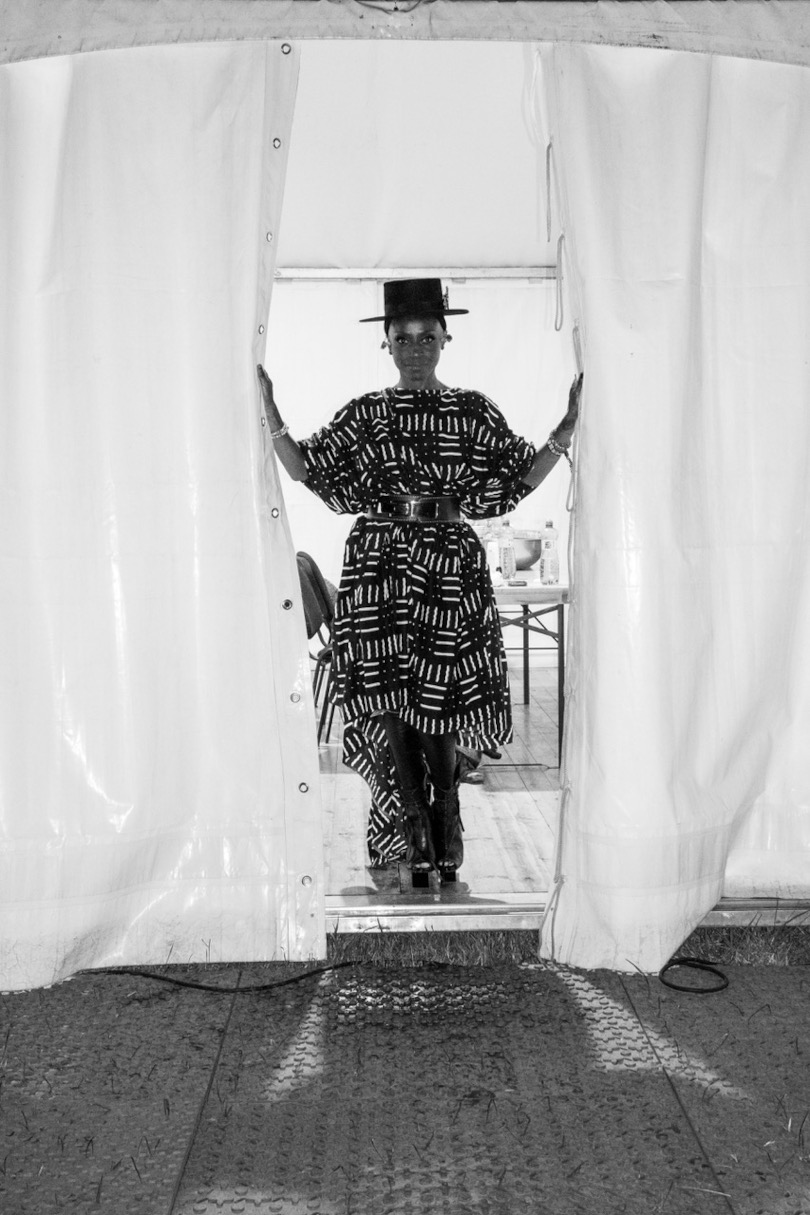
And did having Jaega and Steve involved allow for more spontaneity and maybe some improvisation in the tracks as well?
Ross: Yes. It's a lot quicker then because if I'm doing everything at home, it takes me ages. I have to learn some drums and then play some bass and then play some keyboards and then play some guitar. And it's not very interactive. It's a slow layer, it's like baking a cake. Whereas when you're playing with other people, it's more like making a stir fry. You just throw loads of things in and stir it around. (laughs)
I see. And that's a nice bridge for the next question. Your production usually blends electronics with organic instruments in very elegant layers, from Moog synthesizers to cello and flute. Can you walk us through how you approach those decisions when producing a Morcheeba album?
Ross: They’re not really decisions – things just happen. It depends on what I've got in my studio that day. I work in a fairly small room and have lots of instruments, most of which stay in the garage or loft or are borrowed by my daughters. So I just find something around the house, bring it to the studio, and try to fit it into the track I’m working on. And what I try to do over the course of an album is use all of the instruments that I have, so there are enough little different flavours. Well, a lot of it is very organic, like you say, I've got lots of old analogue synths and keyboards like Wurlitzer pianos and Hohner clavinets and I play guitar mainly, so a lot of it is kind of fiddling with guitar sounds and trying to get interesting textures with guitar using effects like tape echoes and things like that.
Sounds great. Is there a song on the new album that holds a special meaning for you and if so, why?
Skye: I think there are two. "Call for Love", I really agree. It's an apology. At first, I wondered what I’d like to hear from a certain someone. In the end, I realised I needed to say that to them myself. And I also love "Hold It Down" – it's about a family member returning to the fold after having not spoken to each other for a little while, so those two are my favourite songs. I also love "Escape the Chaos".
Ross: I like "Escape the Chaos".
Skye: It's brilliant, it works so well. We don't play it live, but after we've finished the show, they play that song as people are leaving – and it works really well. It's such a lovely, lovely song. It's very Mocheeba that one.
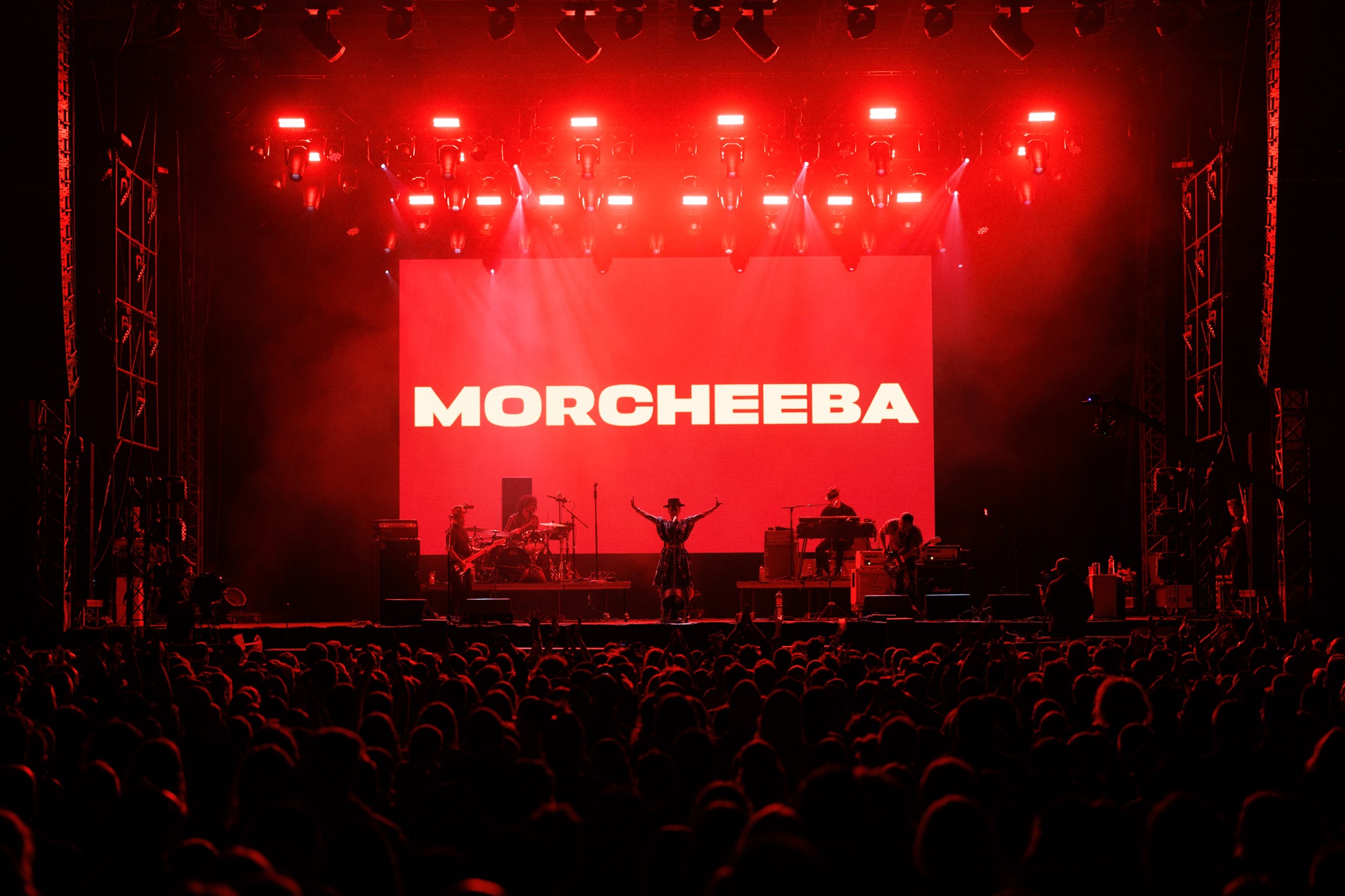
Yes, it is. The song "We Live and Die" reflects Skye’s journey with the band and the music world in general. Looking back on the 30 years with Mocheeba, is there anything you wish you had done differently?
Ross: Yeah, nearly everything. (laughs) But you can't really change the past, so you just have to try and make up for it in the present. And, you know, we've always had a lot of fun. There's been some hard times, but we've been very lucky overall. I mean, our lives are very nice. We're surrounded by lovely people and family and we make enough money to have a nice life. So really, we can't complain about anything because it would be wrong because people have harder lives than us. We're very lucky.
You appreciate what you have. That's great. Your brother...
Tour manager: Sorry, we're running out of time.
Ross: That was a great edit! We didn't need that last question. (laughs)
Okay. The very last question: We're speaking on the day of your performance at the Pohoda Festival. Is there a song you never get tired of playing live?
Skye: Wow… "The Sea", "Blindfold", "Never an Easy Way".
Ross: Yeah, "Never an Easy Way". I think we've been playing that for 30 years now. And whenever I take it out of the set, everyone goes, oh, you've got to put that back in. And I'm like, all right. (laughs)
And you still enjoy playing it, right?
Ross: Yeah, it's a nice vibe. "The Sea", definitely. The audience always likes "The Sea" as well. But we're looking forward to the Pohoda Festival. We were here last year and we were just about to go on stage and then there was a tornado. And so, we're back and we're going to try and finish it this time.
Skye: Yeah!
We're looking forward to your concert. Thank you very much for the interview!
Ross: Just out of interest, what was the question about Paul?
I was about to ask how the creative process has changed since your brother left the band in 2014.
Ross: That's not that bad. Basically, he used to write a lot of the lyrics. And so now Skye writes a lot of the lyrics. And I mean, that's about it. I think obviously I ended up doing more of the beats and things like that. But then we work with some of the people, like Henry Law of Yimino (an experimental electronic duo) who did some of the beats for me. And just because it's quicker, and otherwise I spend just months programming things and that's a bit boring.
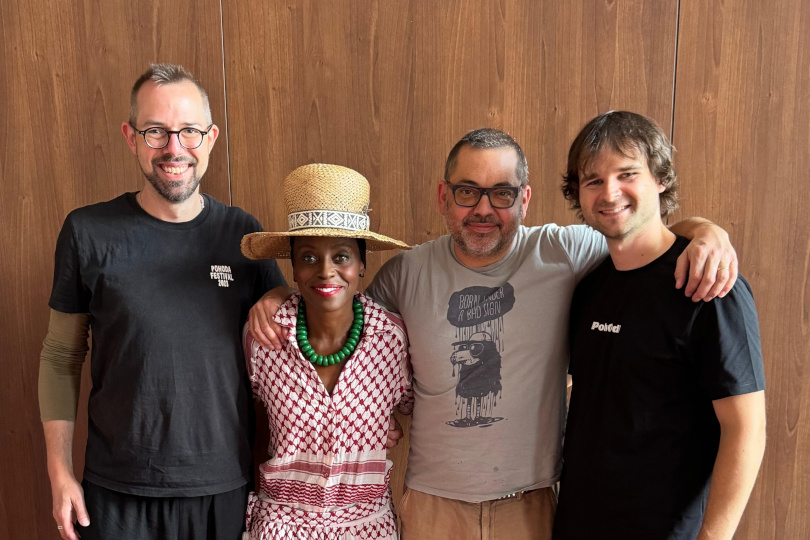
The interview was created in collaboration with Roman Gerhardt (in the photograph, far left).
If you have found an error or typo in the article, please let us know by e-mail info@insounder.org.

